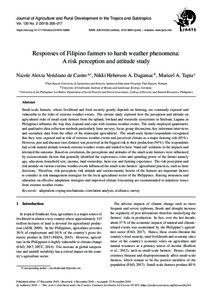Aufsatz

Responses of Filipino farmers to harsh weather phenomena: A risk perception and attitude study
Zusammenfassung
Small-scale farmers, whose livelihood and food security greatly depends on farming, are constantly exposed and vulnerable to the risks of extreme weather events. The current study explored how the perception and attitude on agricultural risks of small-scale farmers from the upland, lowland and waterside ecosystems in Siniloan, Laguna in Philippines influence the way they respond and cope with extreme weather events. The study employed quantitative and qualitative data collection methods particularly farm surveys, focus group discussions, key informant interviews and secondary data from the office of the municipal agriculturist. The small-scale farmer-respondents recognised that they were exposed and at risk of extreme weather events and perceived climate as a major farming risk (85 %). However, pest and diseases (not climate) was perceived as the biggest risk to their production (94 %). The respondents had a risk-neutral attitude towards extreme weather events and tended to have ‘band-aid’ solutions to the impacts and tolerated the outcome. Based on correlation, the perceptions and attitudes of the small-scale farmers were influenced by socioeconomic factors that generally identified the experiences, roles and spending power of the farmer namely age, education, household size, income, land ownership, farm size and farming experience. The risk perception and risk attitude on various extreme weather events influenced the small-scale farmers’ agricultural practices, such as farm decisions. Therefore, risk perception, risk attitude and socioeconomic factors of the farmers are important factors to consider in risk management strategies for the local agricultural sector of the Philippines. Raising awareness and education on effective adaptation strategies and improved climate forecasting are recommended to minimize losses from extreme weather events.
Zitierform
In: Journal of Agriculture and Rural Development in the Tropics and Subtropics (JARTS) Vol. 120 / No. 2 (2019-12-17) , S. 205-217 ; ISSN 2363-6033Zusätzliche Informationen
Gedruckte Ausg. im Verlag Kassel Univ. Press (www.upress.uni-kassel.de) erschienen.Sammlung(en)
Vol 120, No 2 (2019) (Journal of Agriculture and Rural Development in the Tropics and Subtropics (JARTS))Zitieren
@article{doi:10.17170/kobra-20191212866,
author={Castro, Nicole Alexia Veridiano de and Dagamac, Nikki Heherson A. and Tapia, Maricel A.},
title={Responses of Filipino farmers to harsh weather phenomena: A risk perception and attitude study},
journal={Journal of Agriculture and Rural Development in the Tropics and Subtropics (JARTS)},
year={2019}
}
0500 Oax 0501 Text $btxt$2rdacontent 0502 Computermedien $bc$2rdacarrier 1100 2019$n2019 1500 1/eng 2050 ##0##http://hdl.handle.net/123456789/11408 3000 Castro, Nicole Alexia Veridiano de 3010 Dagamac, Nikki Heherson A. 3010 Tapia, Maricel A. 4000 Responses of Filipino farmers to harsh weather phenomena: A risk perception and attitude study / Castro, Nicole Alexia Veridiano de 4030 4060 Online-Ressource 4085 ##0##=u http://nbn-resolving.de/http://hdl.handle.net/123456789/11408=x R 4204 \$dAufsatz 4170 7136 ##0##http://hdl.handle.net/123456789/11408
<resource xsi:schemaLocation="http://datacite.org/schema/kernel-2.2 http://schema.datacite.org/meta/kernel-2.2/metadata.xsd"> 2020-01-06T09:56:50Z 2020-01-06T09:56:50Z 2019-12-17 doi:10.17170/kobra-20191212866 http://hdl.handle.net/123456789/11408 Gedruckte Ausg. im Verlag Kassel Univ. Press (www.upress.uni-kassel.de) erschienen. eng Urheberrechtlich geschützt https://rightsstatements.org/page/InC/1.0/ adaptation coping mechanisms correlation analysis resilience survey 630 Responses of Filipino farmers to harsh weather phenomena: A risk perception and attitude study Aufsatz Small-scale farmers, whose livelihood and food security greatly depends on farming, are constantly exposed and vulnerable to the risks of extreme weather events. The current study explored how the perception and attitude on agricultural risks of small-scale farmers from the upland, lowland and waterside ecosystems in Siniloan, Laguna in Philippines influence the way they respond and cope with extreme weather events. The study employed quantitative and qualitative data collection methods particularly farm surveys, focus group discussions, key informant interviews and secondary data from the office of the municipal agriculturist. The small-scale farmer-respondents recognised that they were exposed and at risk of extreme weather events and perceived climate as a major farming risk (85 %). However, pest and diseases (not climate) was perceived as the biggest risk to their production (94 %). The respondents had a risk-neutral attitude towards extreme weather events and tended to have ‘band-aid’ solutions to the impacts and tolerated the outcome. Based on correlation, the perceptions and attitudes of the small-scale farmers were influenced by socioeconomic factors that generally identified the experiences, roles and spending power of the farmer namely age, education, household size, income, land ownership, farm size and farming experience. The risk perception and risk attitude on various extreme weather events influenced the small-scale farmers’ agricultural practices, such as farm decisions. Therefore, risk perception, risk attitude and socioeconomic factors of the farmers are important factors to consider in risk management strategies for the local agricultural sector of the Philippines. Raising awareness and education on effective adaptation strategies and improved climate forecasting are recommended to minimize losses from extreme weather events. open access Castro, Nicole Alexia Veridiano de Dagamac, Nikki Heherson A. Tapia, Maricel A. publishedVersion ISSN 2363-6033 No. 2 Journal of Agriculture and Rural Development in the Tropics and Subtropics (JARTS) 205-217 Vol. 120 </resource>
Die folgenden Lizenzbestimmungen sind mit dieser Ressource verbunden:
Urheberrechtlich geschützt

